Leadership and Management Theory, Practice, and Personal Growth Plan
VerifiedAdded on 2023/06/18
|10
|2817
|115
Report
AI Summary
This report provides a comprehensive analysis of leadership and management theories in practice, focusing on personal growth and self-improvement strategies. It examines the author's management perspective, emphasizing the importance of listening skills, collaboration, and continuous learning. The report applies leadership hypotheses and conceptual frameworks to assess David Fattal, the founder of Leonardo Hotels, highlighting various leadership styles and their impact on organizational success. It identifies personal growth domains, suggesting the delegation of authoritative tasks and the encouragement of decision-making to foster employee engagement and versatility. An action plan is included to facilitate the development of leadership skills and achieve both individual and professional objectives. The report concludes by emphasizing the significance of ethical virtues and the need for managers to adapt their leadership style to different situations to enhance organizational effectiveness.
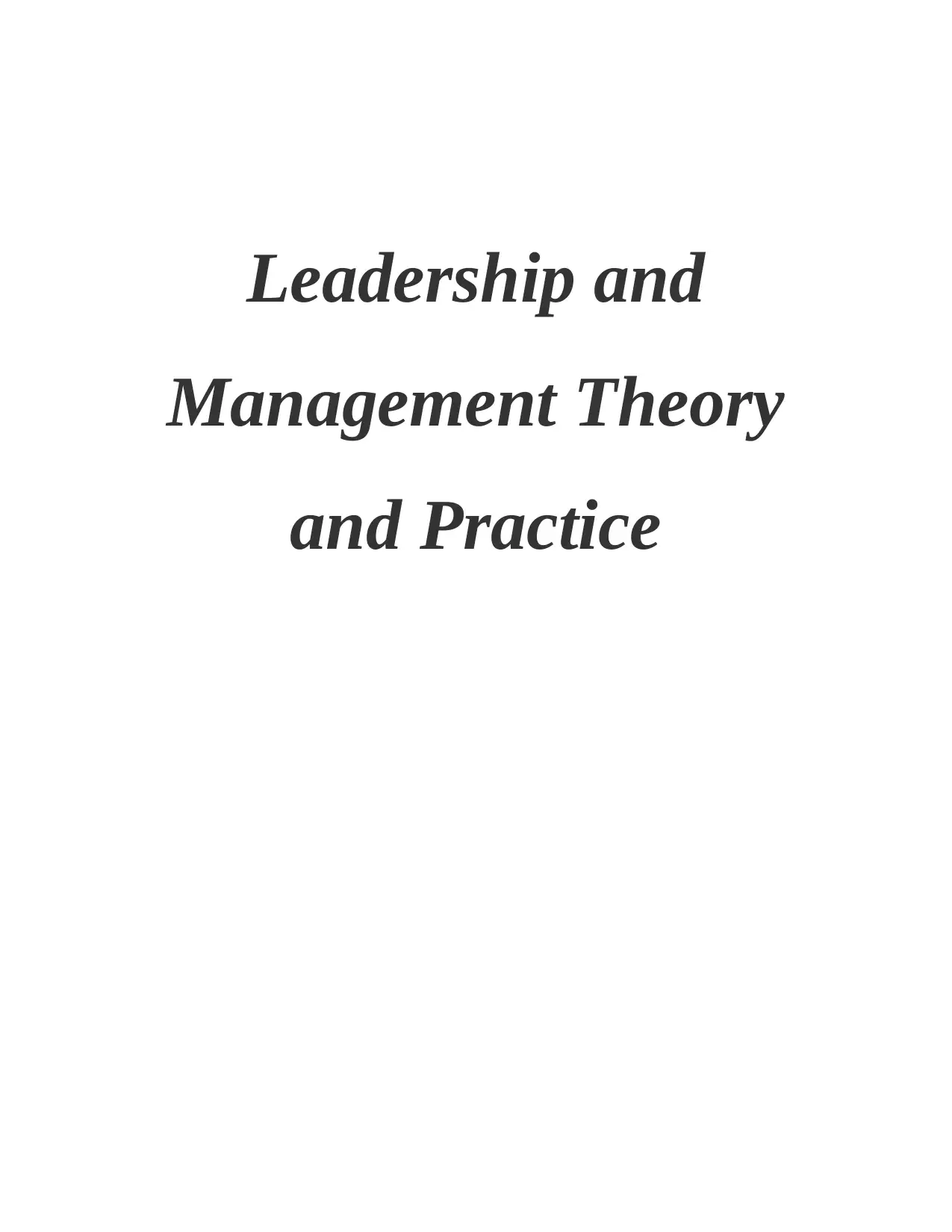
Leadership and
Management Theory
and Practice
Management Theory
and Practice
Paraphrase This Document
Need a fresh take? Get an instant paraphrase of this document with our AI Paraphraser
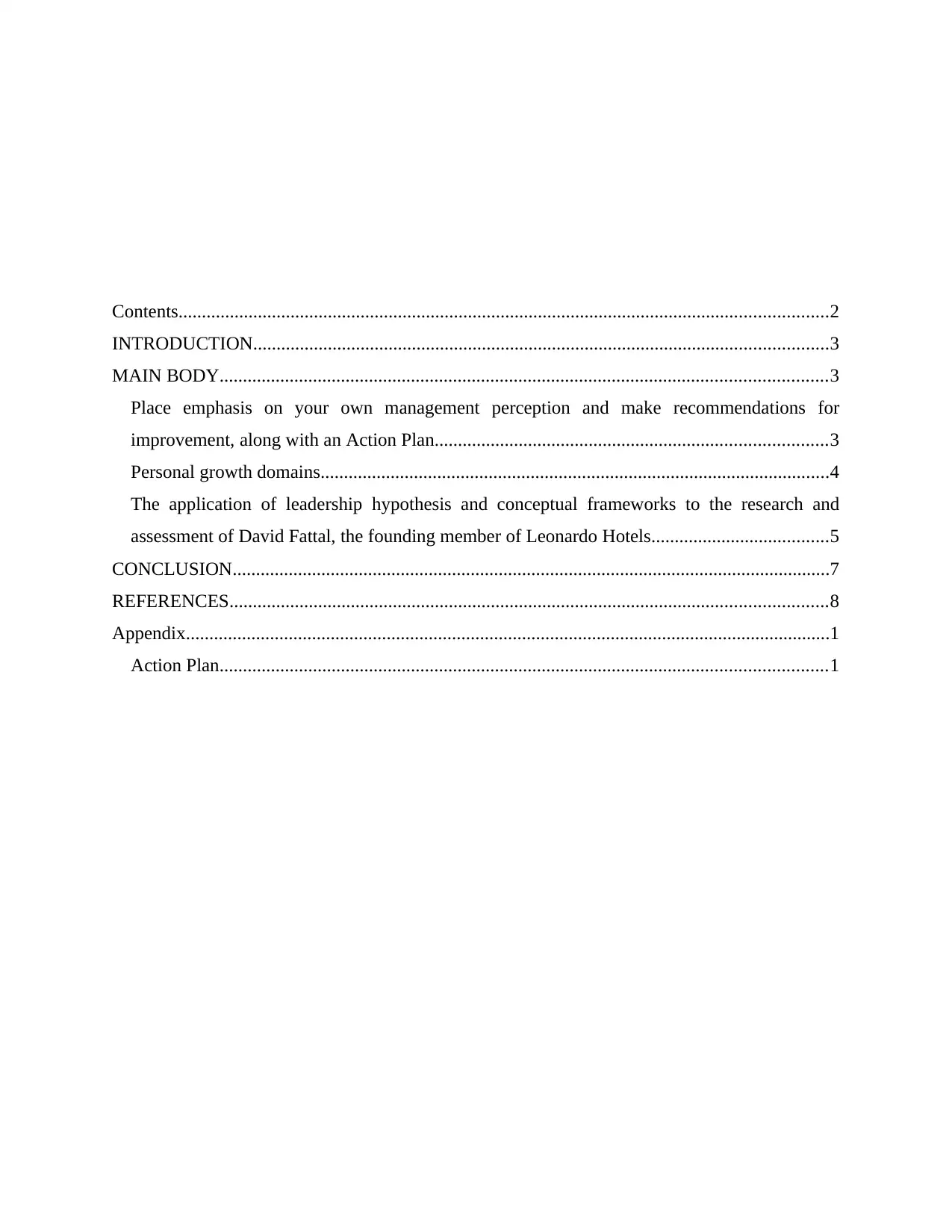
Contents...........................................................................................................................................2
INTRODUCTION...........................................................................................................................3
MAIN BODY..................................................................................................................................3
Place emphasis on your own management perception and make recommendations for
improvement, along with an Action Plan....................................................................................3
Personal growth domains.............................................................................................................4
The application of leadership hypothesis and conceptual frameworks to the research and
assessment of David Fattal, the founding member of Leonardo Hotels......................................5
CONCLUSION................................................................................................................................7
REFERENCES................................................................................................................................8
Appendix..........................................................................................................................................1
Action Plan..................................................................................................................................1
INTRODUCTION...........................................................................................................................3
MAIN BODY..................................................................................................................................3
Place emphasis on your own management perception and make recommendations for
improvement, along with an Action Plan....................................................................................3
Personal growth domains.............................................................................................................4
The application of leadership hypothesis and conceptual frameworks to the research and
assessment of David Fattal, the founding member of Leonardo Hotels......................................5
CONCLUSION................................................................................................................................7
REFERENCES................................................................................................................................8
Appendix..........................................................................................................................................1
Action Plan..................................................................................................................................1
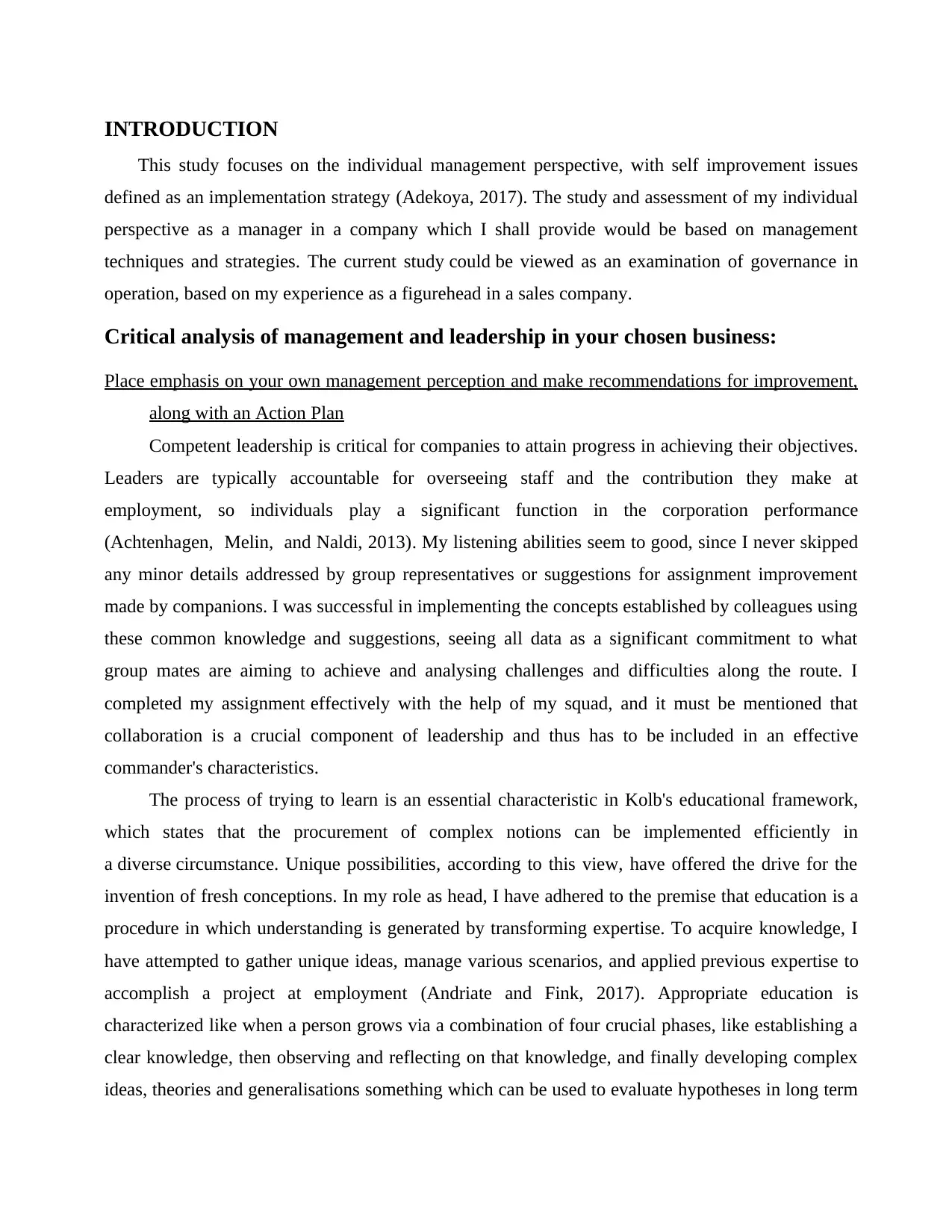
INTRODUCTION
This study focuses on the individual management perspective, with self improvement issues
defined as an implementation strategy (Adekoya, 2017). The study and assessment of my individual
perspective as a manager in a company which I shall provide would be based on management
techniques and strategies. The current study could be viewed as an examination of governance in
operation, based on my experience as a figurehead in a sales company.
Critical analysis of management and leadership in your chosen business:
Place emphasis on your own management perception and make recommendations for improvement,
along with an Action Plan
Competent leadership is critical for companies to attain progress in achieving their objectives.
Leaders are typically accountable for overseeing staff and the contribution they make at
employment, so individuals play a significant function in the corporation performance
(Achtenhagen, Melin, and Naldi, 2013). My listening abilities seem to good, since I never skipped
any minor details addressed by group representatives or suggestions for assignment improvement
made by companions. I was successful in implementing the concepts established by colleagues using
these common knowledge and suggestions, seeing all data as a significant commitment to what
group mates are aiming to achieve and analysing challenges and difficulties along the route. I
completed my assignment effectively with the help of my squad, and it must be mentioned that
collaboration is a crucial component of leadership and thus has to be included in an effective
commander's characteristics.
The process of trying to learn is an essential characteristic in Kolb's educational framework,
which states that the procurement of complex notions can be implemented efficiently in
a diverse circumstance. Unique possibilities, according to this view, have offered the drive for the
invention of fresh conceptions. In my role as head, I have adhered to the premise that education is a
procedure in which understanding is generated by transforming expertise. To acquire knowledge, I
have attempted to gather unique ideas, manage various scenarios, and applied previous expertise to
accomplish a project at employment (Andriate and Fink, 2017). Appropriate education is
characterized like when a person grows via a combination of four crucial phases, like establishing a
clear knowledge, then observing and reflecting on that knowledge, and finally developing complex
ideas, theories and generalisations something which can be used to evaluate hypotheses in long term
This study focuses on the individual management perspective, with self improvement issues
defined as an implementation strategy (Adekoya, 2017). The study and assessment of my individual
perspective as a manager in a company which I shall provide would be based on management
techniques and strategies. The current study could be viewed as an examination of governance in
operation, based on my experience as a figurehead in a sales company.
Critical analysis of management and leadership in your chosen business:
Place emphasis on your own management perception and make recommendations for improvement,
along with an Action Plan
Competent leadership is critical for companies to attain progress in achieving their objectives.
Leaders are typically accountable for overseeing staff and the contribution they make at
employment, so individuals play a significant function in the corporation performance
(Achtenhagen, Melin, and Naldi, 2013). My listening abilities seem to good, since I never skipped
any minor details addressed by group representatives or suggestions for assignment improvement
made by companions. I was successful in implementing the concepts established by colleagues using
these common knowledge and suggestions, seeing all data as a significant commitment to what
group mates are aiming to achieve and analysing challenges and difficulties along the route. I
completed my assignment effectively with the help of my squad, and it must be mentioned that
collaboration is a crucial component of leadership and thus has to be included in an effective
commander's characteristics.
The process of trying to learn is an essential characteristic in Kolb's educational framework,
which states that the procurement of complex notions can be implemented efficiently in
a diverse circumstance. Unique possibilities, according to this view, have offered the drive for the
invention of fresh conceptions. In my role as head, I have adhered to the premise that education is a
procedure in which understanding is generated by transforming expertise. To acquire knowledge, I
have attempted to gather unique ideas, manage various scenarios, and applied previous expertise to
accomplish a project at employment (Andriate and Fink, 2017). Appropriate education is
characterized like when a person grows via a combination of four crucial phases, like establishing a
clear knowledge, then observing and reflecting on that knowledge, and finally developing complex
ideas, theories and generalisations something which can be used to evaluate hypotheses in long term
⊘ This is a preview!⊘
Do you want full access?
Subscribe today to unlock all pages.

Trusted by 1+ million students worldwide
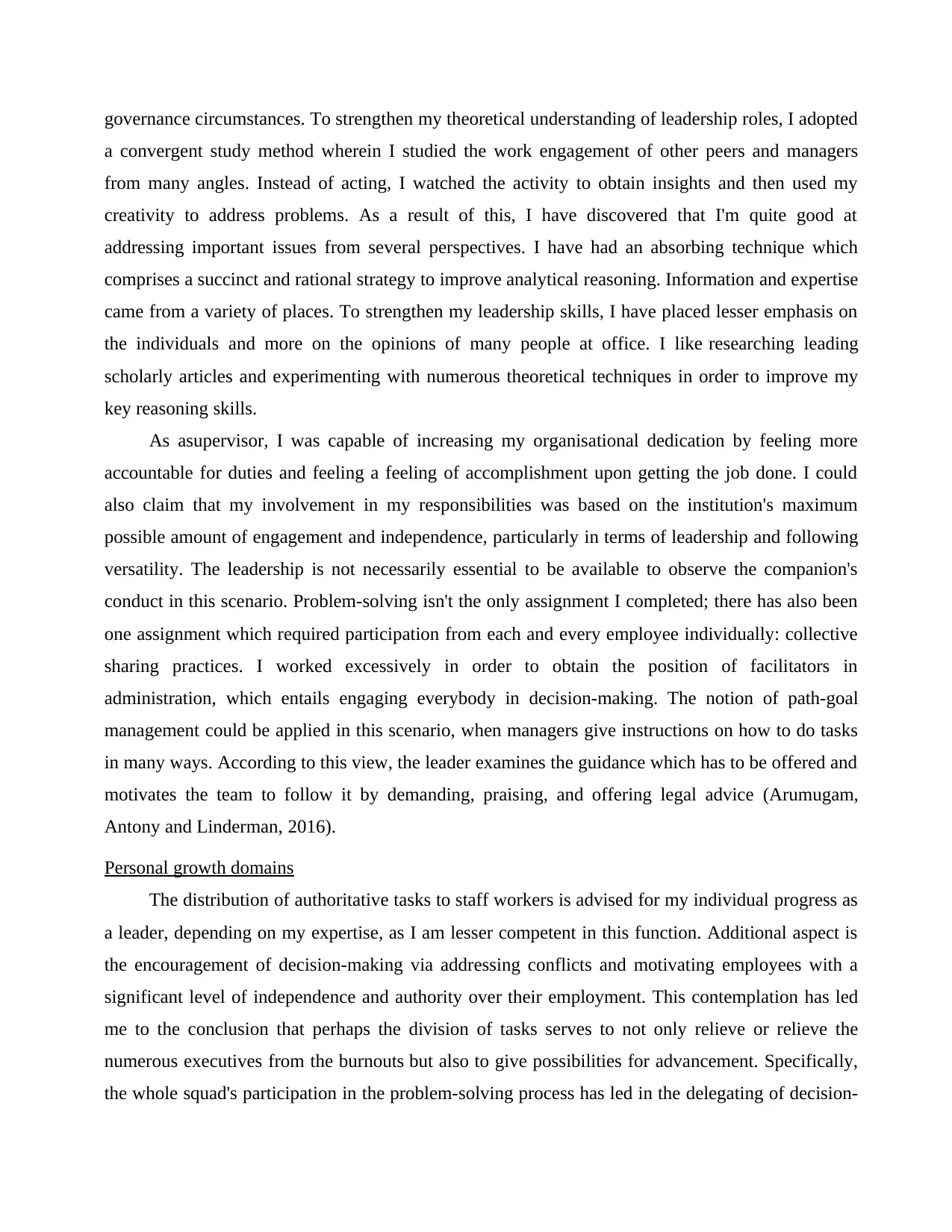
governance circumstances. To strengthen my theoretical understanding of leadership roles, I adopted
a convergent study method wherein I studied the work engagement of other peers and managers
from many angles. Instead of acting, I watched the activity to obtain insights and then used my
creativity to address problems. As a result of this, I have discovered that I'm quite good at
addressing important issues from several perspectives. I have had an absorbing technique which
comprises a succinct and rational strategy to improve analytical reasoning. Information and expertise
came from a variety of places. To strengthen my leadership skills, I have placed lesser emphasis on
the individuals and more on the opinions of many people at office. I like researching leading
scholarly articles and experimenting with numerous theoretical techniques in order to improve my
key reasoning skills.
As asupervisor, I was capable of increasing my organisational dedication by feeling more
accountable for duties and feeling a feeling of accomplishment upon getting the job done. I could
also claim that my involvement in my responsibilities was based on the institution's maximum
possible amount of engagement and independence, particularly in terms of leadership and following
versatility. The leadership is not necessarily essential to be available to observe the companion's
conduct in this scenario. Problem-solving isn't the only assignment I completed; there has also been
one assignment which required participation from each and every employee individually: collective
sharing practices. I worked excessively in order to obtain the position of facilitators in
administration, which entails engaging everybody in decision-making. The notion of path-goal
management could be applied in this scenario, when managers give instructions on how to do tasks
in many ways. According to this view, the leader examines the guidance which has to be offered and
motivates the team to follow it by demanding, praising, and offering legal advice (Arumugam,
Antony and Linderman, 2016).
Personal growth domains
The distribution of authoritative tasks to staff workers is advised for my individual progress as
a leader, depending on my expertise, as I am lesser competent in this function. Additional aspect is
the encouragement of decision-making via addressing conflicts and motivating employees with a
significant level of independence and authority over their employment. This contemplation has led
me to the conclusion that perhaps the division of tasks serves to not only relieve or relieve the
numerous executives from the burnouts but also to give possibilities for advancement. Specifically,
the whole squad's participation in the problem-solving process has led in the delegating of decision-
a convergent study method wherein I studied the work engagement of other peers and managers
from many angles. Instead of acting, I watched the activity to obtain insights and then used my
creativity to address problems. As a result of this, I have discovered that I'm quite good at
addressing important issues from several perspectives. I have had an absorbing technique which
comprises a succinct and rational strategy to improve analytical reasoning. Information and expertise
came from a variety of places. To strengthen my leadership skills, I have placed lesser emphasis on
the individuals and more on the opinions of many people at office. I like researching leading
scholarly articles and experimenting with numerous theoretical techniques in order to improve my
key reasoning skills.
As asupervisor, I was capable of increasing my organisational dedication by feeling more
accountable for duties and feeling a feeling of accomplishment upon getting the job done. I could
also claim that my involvement in my responsibilities was based on the institution's maximum
possible amount of engagement and independence, particularly in terms of leadership and following
versatility. The leadership is not necessarily essential to be available to observe the companion's
conduct in this scenario. Problem-solving isn't the only assignment I completed; there has also been
one assignment which required participation from each and every employee individually: collective
sharing practices. I worked excessively in order to obtain the position of facilitators in
administration, which entails engaging everybody in decision-making. The notion of path-goal
management could be applied in this scenario, when managers give instructions on how to do tasks
in many ways. According to this view, the leader examines the guidance which has to be offered and
motivates the team to follow it by demanding, praising, and offering legal advice (Arumugam,
Antony and Linderman, 2016).
Personal growth domains
The distribution of authoritative tasks to staff workers is advised for my individual progress as
a leader, depending on my expertise, as I am lesser competent in this function. Additional aspect is
the encouragement of decision-making via addressing conflicts and motivating employees with a
significant level of independence and authority over their employment. This contemplation has led
me to the conclusion that perhaps the division of tasks serves to not only relieve or relieve the
numerous executives from the burnouts but also to give possibilities for advancement. Specifically,
the whole squad's participation in the problem-solving process has led in the delegating of decision-
Paraphrase This Document
Need a fresh take? Get an instant paraphrase of this document with our AI Paraphraser
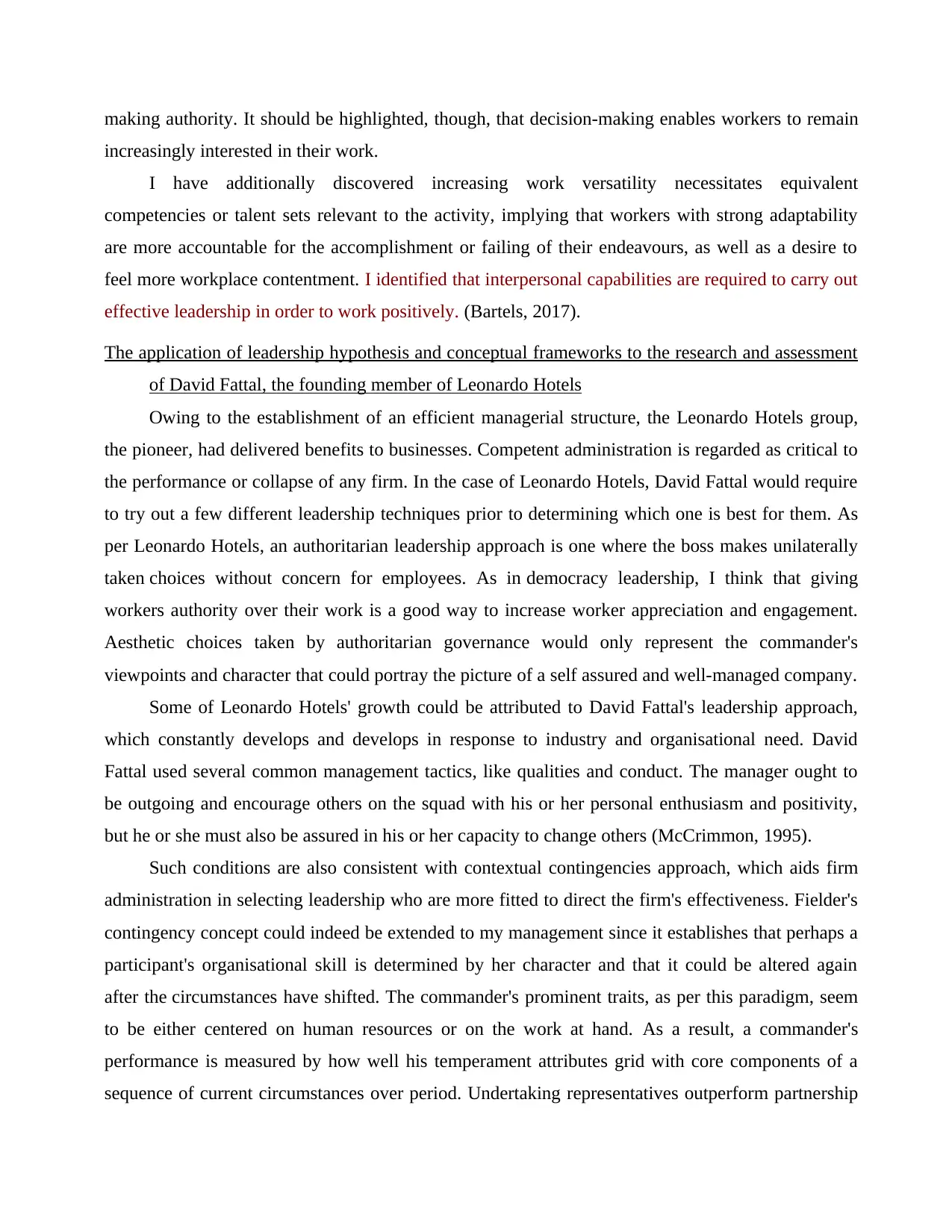
making authority. It should be highlighted, though, that decision-making enables workers to remain
increasingly interested in their work.
I have additionally discovered increasing work versatility necessitates equivalent
competencies or talent sets relevant to the activity, implying that workers with strong adaptability
are more accountable for the accomplishment or failing of their endeavours, as well as a desire to
feel more workplace contentment. I identified that interpersonal capabilities are required to carry out
effective leadership in order to work positively. (Bartels, 2017).
The application of leadership hypothesis and conceptual frameworks to the research and assessment
of David Fattal, the founding member of Leonardo Hotels
Owing to the establishment of an efficient managerial structure, the Leonardo Hotels group,
the pioneer, had delivered benefits to businesses. Competent administration is regarded as critical to
the performance or collapse of any firm. In the case of Leonardo Hotels, David Fattal would require
to try out a few different leadership techniques prior to determining which one is best for them. As
per Leonardo Hotels, an authoritarian leadership approach is one where the boss makes unilaterally
taken choices without concern for employees. As in democracy leadership, I think that giving
workers authority over their work is a good way to increase worker appreciation and engagement.
Aesthetic choices taken by authoritarian governance would only represent the commander's
viewpoints and character that could portray the picture of a self assured and well-managed company.
Some of Leonardo Hotels' growth could be attributed to David Fattal's leadership approach,
which constantly develops and develops in response to industry and organisational need. David
Fattal used several common management tactics, like qualities and conduct. The manager ought to
be outgoing and encourage others on the squad with his or her personal enthusiasm and positivity,
but he or she must also be assured in his or her capacity to change others (McCrimmon, 1995).
Such conditions are also consistent with contextual contingencies approach, which aids firm
administration in selecting leadership who are more fitted to direct the firm's effectiveness. Fielder's
contingency concept could indeed be extended to my management since it establishes that perhaps a
participant's organisational skill is determined by her character and that it could be altered again
after the circumstances have shifted. The commander's prominent traits, as per this paradigm, seem
to be either centered on human resources or on the work at hand. As a result, a commander's
performance is measured by how well his temperament attributes grid with core components of a
sequence of current circumstances over period. Undertaking representatives outperform partnership
increasingly interested in their work.
I have additionally discovered increasing work versatility necessitates equivalent
competencies or talent sets relevant to the activity, implying that workers with strong adaptability
are more accountable for the accomplishment or failing of their endeavours, as well as a desire to
feel more workplace contentment. I identified that interpersonal capabilities are required to carry out
effective leadership in order to work positively. (Bartels, 2017).
The application of leadership hypothesis and conceptual frameworks to the research and assessment
of David Fattal, the founding member of Leonardo Hotels
Owing to the establishment of an efficient managerial structure, the Leonardo Hotels group,
the pioneer, had delivered benefits to businesses. Competent administration is regarded as critical to
the performance or collapse of any firm. In the case of Leonardo Hotels, David Fattal would require
to try out a few different leadership techniques prior to determining which one is best for them. As
per Leonardo Hotels, an authoritarian leadership approach is one where the boss makes unilaterally
taken choices without concern for employees. As in democracy leadership, I think that giving
workers authority over their work is a good way to increase worker appreciation and engagement.
Aesthetic choices taken by authoritarian governance would only represent the commander's
viewpoints and character that could portray the picture of a self assured and well-managed company.
Some of Leonardo Hotels' growth could be attributed to David Fattal's leadership approach,
which constantly develops and develops in response to industry and organisational need. David
Fattal used several common management tactics, like qualities and conduct. The manager ought to
be outgoing and encourage others on the squad with his or her personal enthusiasm and positivity,
but he or she must also be assured in his or her capacity to change others (McCrimmon, 1995).
Such conditions are also consistent with contextual contingencies approach, which aids firm
administration in selecting leadership who are more fitted to direct the firm's effectiveness. Fielder's
contingency concept could indeed be extended to my management since it establishes that perhaps a
participant's organisational skill is determined by her character and that it could be altered again
after the circumstances have shifted. The commander's prominent traits, as per this paradigm, seem
to be either centered on human resources or on the work at hand. As a result, a commander's
performance is measured by how well his temperament attributes grid with core components of a
sequence of current circumstances over period. Undertaking representatives outperform partnership
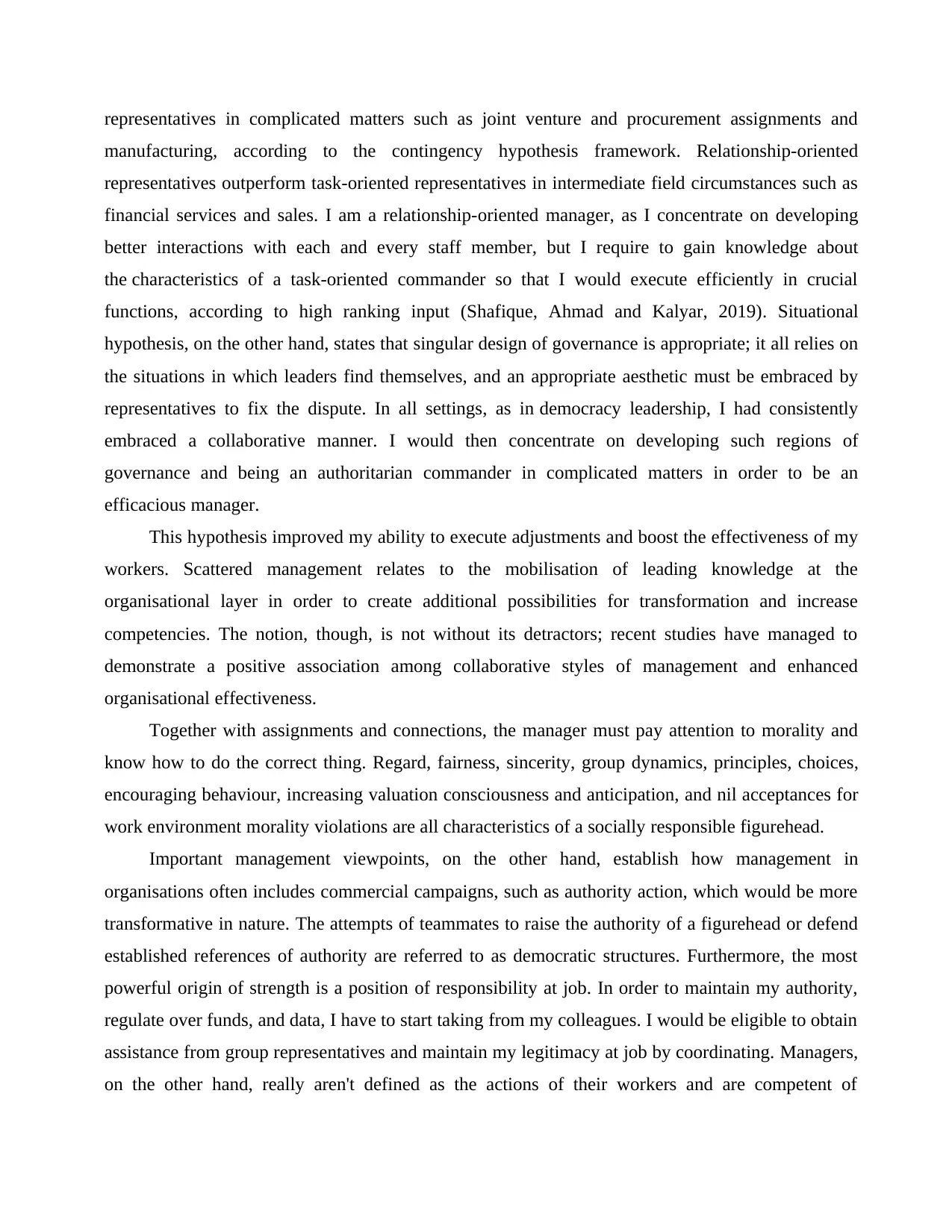
representatives in complicated matters such as joint venture and procurement assignments and
manufacturing, according to the contingency hypothesis framework. Relationship-oriented
representatives outperform task-oriented representatives in intermediate field circumstances such as
financial services and sales. I am a relationship-oriented manager, as I concentrate on developing
better interactions with each and every staff member, but I require to gain knowledge about
the characteristics of a task-oriented commander so that I would execute efficiently in crucial
functions, according to high ranking input (Shafique, Ahmad and Kalyar, 2019). Situational
hypothesis, on the other hand, states that singular design of governance is appropriate; it all relies on
the situations in which leaders find themselves, and an appropriate aesthetic must be embraced by
representatives to fix the dispute. In all settings, as in democracy leadership, I had consistently
embraced a collaborative manner. I would then concentrate on developing such regions of
governance and being an authoritarian commander in complicated matters in order to be an
efficacious manager.
This hypothesis improved my ability to execute adjustments and boost the effectiveness of my
workers. Scattered management relates to the mobilisation of leading knowledge at the
organisational layer in order to create additional possibilities for transformation and increase
competencies. The notion, though, is not without its detractors; recent studies have managed to
demonstrate a positive association among collaborative styles of management and enhanced
organisational effectiveness.
Together with assignments and connections, the manager must pay attention to morality and
know how to do the correct thing. Regard, fairness, sincerity, group dynamics, principles, choices,
encouraging behaviour, increasing valuation consciousness and anticipation, and nil acceptances for
work environment morality violations are all characteristics of a socially responsible figurehead.
Important management viewpoints, on the other hand, establish how management in
organisations often includes commercial campaigns, such as authority action, which would be more
transformative in nature. The attempts of teammates to raise the authority of a figurehead or defend
established references of authority are referred to as democratic structures. Furthermore, the most
powerful origin of strength is a position of responsibility at job. In order to maintain my authority,
regulate over funds, and data, I have to start taking from my colleagues. I would be eligible to obtain
assistance from group representatives and maintain my legitimacy at job by coordinating. Managers,
on the other hand, really aren't defined as the actions of their workers and are competent of
manufacturing, according to the contingency hypothesis framework. Relationship-oriented
representatives outperform task-oriented representatives in intermediate field circumstances such as
financial services and sales. I am a relationship-oriented manager, as I concentrate on developing
better interactions with each and every staff member, but I require to gain knowledge about
the characteristics of a task-oriented commander so that I would execute efficiently in crucial
functions, according to high ranking input (Shafique, Ahmad and Kalyar, 2019). Situational
hypothesis, on the other hand, states that singular design of governance is appropriate; it all relies on
the situations in which leaders find themselves, and an appropriate aesthetic must be embraced by
representatives to fix the dispute. In all settings, as in democracy leadership, I had consistently
embraced a collaborative manner. I would then concentrate on developing such regions of
governance and being an authoritarian commander in complicated matters in order to be an
efficacious manager.
This hypothesis improved my ability to execute adjustments and boost the effectiveness of my
workers. Scattered management relates to the mobilisation of leading knowledge at the
organisational layer in order to create additional possibilities for transformation and increase
competencies. The notion, though, is not without its detractors; recent studies have managed to
demonstrate a positive association among collaborative styles of management and enhanced
organisational effectiveness.
Together with assignments and connections, the manager must pay attention to morality and
know how to do the correct thing. Regard, fairness, sincerity, group dynamics, principles, choices,
encouraging behaviour, increasing valuation consciousness and anticipation, and nil acceptances for
work environment morality violations are all characteristics of a socially responsible figurehead.
Important management viewpoints, on the other hand, establish how management in
organisations often includes commercial campaigns, such as authority action, which would be more
transformative in nature. The attempts of teammates to raise the authority of a figurehead or defend
established references of authority are referred to as democratic structures. Furthermore, the most
powerful origin of strength is a position of responsibility at job. In order to maintain my authority,
regulate over funds, and data, I have to start taking from my colleagues. I would be eligible to obtain
assistance from group representatives and maintain my legitimacy at job by coordinating. Managers,
on the other hand, really aren't defined as the actions of their workers and are competent of
⊘ This is a preview!⊘
Do you want full access?
Subscribe today to unlock all pages.

Trusted by 1+ million students worldwide
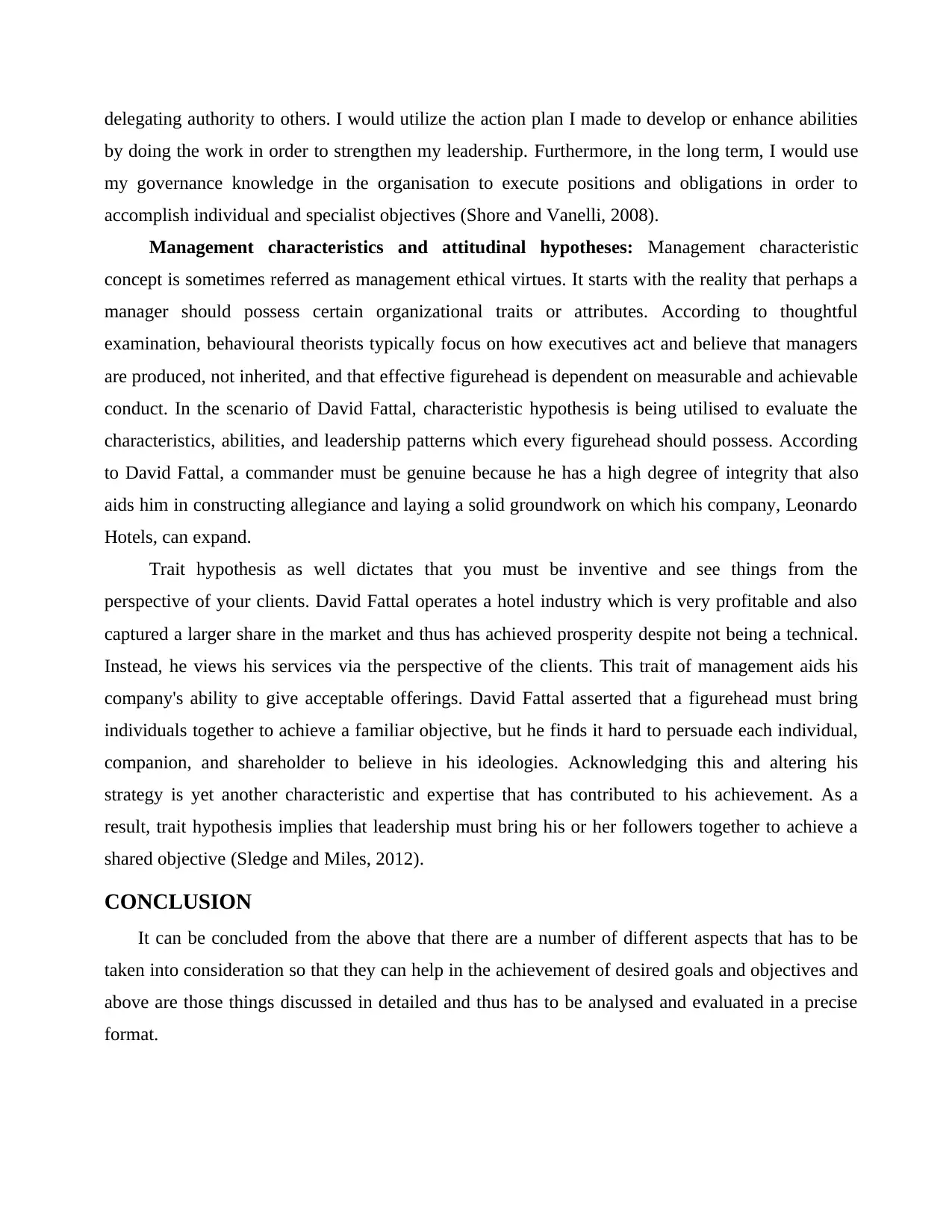
delegating authority to others. I would utilize the action plan I made to develop or enhance abilities
by doing the work in order to strengthen my leadership. Furthermore, in the long term, I would use
my governance knowledge in the organisation to execute positions and obligations in order to
accomplish individual and specialist objectives (Shore and Vanelli, 2008).
Management characteristics and attitudinal hypotheses: Management characteristic
concept is sometimes referred as management ethical virtues. It starts with the reality that perhaps a
manager should possess certain organizational traits or attributes. According to thoughtful
examination, behavioural theorists typically focus on how executives act and believe that managers
are produced, not inherited, and that effective figurehead is dependent on measurable and achievable
conduct. In the scenario of David Fattal, characteristic hypothesis is being utilised to evaluate the
characteristics, abilities, and leadership patterns which every figurehead should possess. According
to David Fattal, a commander must be genuine because he has a high degree of integrity that also
aids him in constructing allegiance and laying a solid groundwork on which his company, Leonardo
Hotels, can expand.
Trait hypothesis as well dictates that you must be inventive and see things from the
perspective of your clients. David Fattal operates a hotel industry which is very profitable and also
captured a larger share in the market and thus has achieved prosperity despite not being a technical.
Instead, he views his services via the perspective of the clients. This trait of management aids his
company's ability to give acceptable offerings. David Fattal asserted that a figurehead must bring
individuals together to achieve a familiar objective, but he finds it hard to persuade each individual,
companion, and shareholder to believe in his ideologies. Acknowledging this and altering his
strategy is yet another characteristic and expertise that has contributed to his achievement. As a
result, trait hypothesis implies that leadership must bring his or her followers together to achieve a
shared objective (Sledge and Miles, 2012).
CONCLUSION
It can be concluded from the above that there are a number of different aspects that has to be
taken into consideration so that they can help in the achievement of desired goals and objectives and
above are those things discussed in detailed and thus has to be analysed and evaluated in a precise
format.
by doing the work in order to strengthen my leadership. Furthermore, in the long term, I would use
my governance knowledge in the organisation to execute positions and obligations in order to
accomplish individual and specialist objectives (Shore and Vanelli, 2008).
Management characteristics and attitudinal hypotheses: Management characteristic
concept is sometimes referred as management ethical virtues. It starts with the reality that perhaps a
manager should possess certain organizational traits or attributes. According to thoughtful
examination, behavioural theorists typically focus on how executives act and believe that managers
are produced, not inherited, and that effective figurehead is dependent on measurable and achievable
conduct. In the scenario of David Fattal, characteristic hypothesis is being utilised to evaluate the
characteristics, abilities, and leadership patterns which every figurehead should possess. According
to David Fattal, a commander must be genuine because he has a high degree of integrity that also
aids him in constructing allegiance and laying a solid groundwork on which his company, Leonardo
Hotels, can expand.
Trait hypothesis as well dictates that you must be inventive and see things from the
perspective of your clients. David Fattal operates a hotel industry which is very profitable and also
captured a larger share in the market and thus has achieved prosperity despite not being a technical.
Instead, he views his services via the perspective of the clients. This trait of management aids his
company's ability to give acceptable offerings. David Fattal asserted that a figurehead must bring
individuals together to achieve a familiar objective, but he finds it hard to persuade each individual,
companion, and shareholder to believe in his ideologies. Acknowledging this and altering his
strategy is yet another characteristic and expertise that has contributed to his achievement. As a
result, trait hypothesis implies that leadership must bring his or her followers together to achieve a
shared objective (Sledge and Miles, 2012).
CONCLUSION
It can be concluded from the above that there are a number of different aspects that has to be
taken into consideration so that they can help in the achievement of desired goals and objectives and
above are those things discussed in detailed and thus has to be analysed and evaluated in a precise
format.
Paraphrase This Document
Need a fresh take? Get an instant paraphrase of this document with our AI Paraphraser
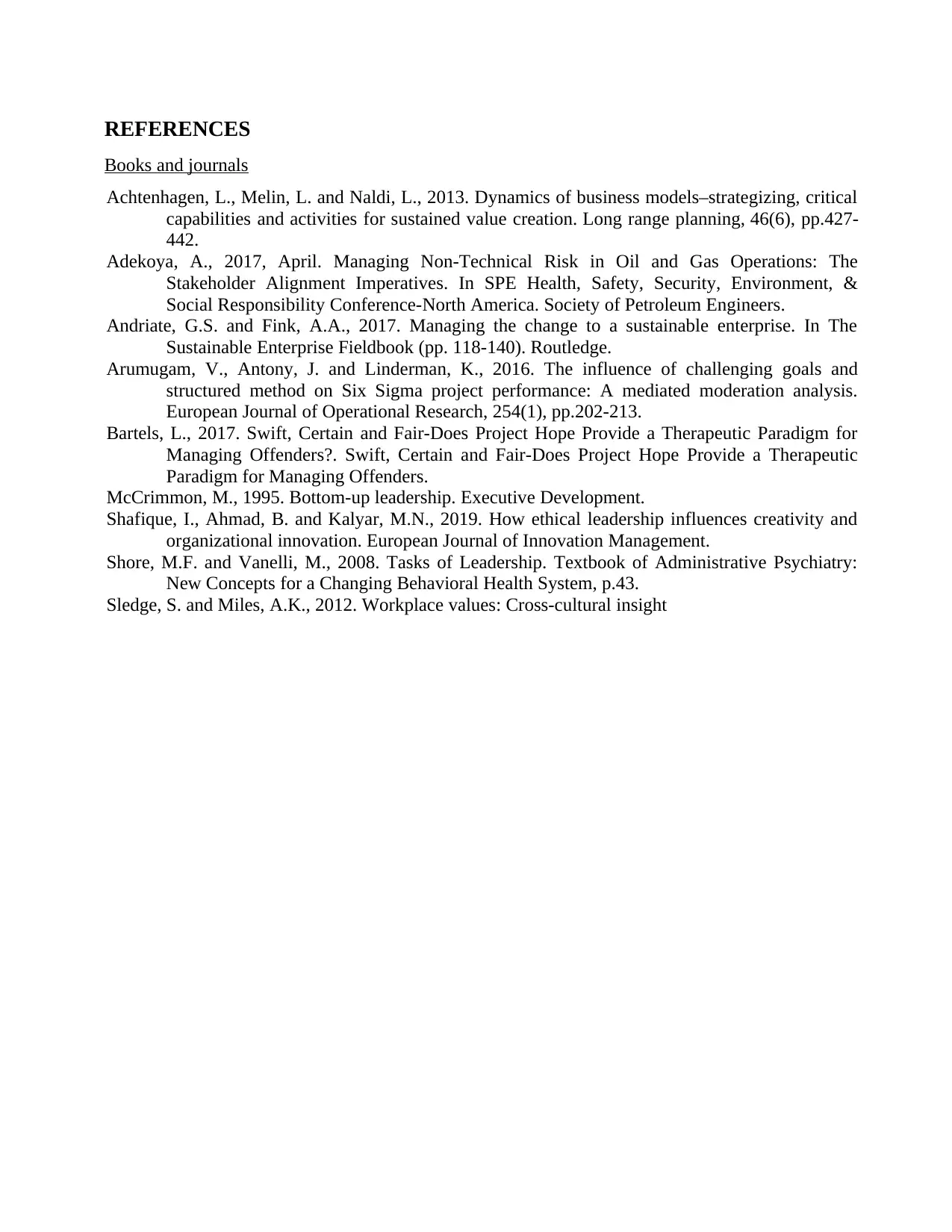
REFERENCES
Books and journals
Achtenhagen, L., Melin, L. and Naldi, L., 2013. Dynamics of business models–strategizing, critical
capabilities and activities for sustained value creation. Long range planning, 46(6), pp.427-
442.
Adekoya, A., 2017, April. Managing Non-Technical Risk in Oil and Gas Operations: The
Stakeholder Alignment Imperatives. In SPE Health, Safety, Security, Environment, &
Social Responsibility Conference-North America. Society of Petroleum Engineers.
Andriate, G.S. and Fink, A.A., 2017. Managing the change to a sustainable enterprise. In The
Sustainable Enterprise Fieldbook (pp. 118-140). Routledge.
Arumugam, V., Antony, J. and Linderman, K., 2016. The influence of challenging goals and
structured method on Six Sigma project performance: A mediated moderation analysis.
European Journal of Operational Research, 254(1), pp.202-213.
Bartels, L., 2017. Swift, Certain and Fair-Does Project Hope Provide a Therapeutic Paradigm for
Managing Offenders?. Swift, Certain and Fair-Does Project Hope Provide a Therapeutic
Paradigm for Managing Offenders.
McCrimmon, M., 1995. Bottom‐up leadership. Executive Development.
Shafique, I., Ahmad, B. and Kalyar, M.N., 2019. How ethical leadership influences creativity and
organizational innovation. European Journal of Innovation Management.
Shore, M.F. and Vanelli, M., 2008. Tasks of Leadership. Textbook of Administrative Psychiatry:
New Concepts for a Changing Behavioral Health System, p.43.
Sledge, S. and Miles, A.K., 2012. Workplace values: Cross-cultural insight
Books and journals
Achtenhagen, L., Melin, L. and Naldi, L., 2013. Dynamics of business models–strategizing, critical
capabilities and activities for sustained value creation. Long range planning, 46(6), pp.427-
442.
Adekoya, A., 2017, April. Managing Non-Technical Risk in Oil and Gas Operations: The
Stakeholder Alignment Imperatives. In SPE Health, Safety, Security, Environment, &
Social Responsibility Conference-North America. Society of Petroleum Engineers.
Andriate, G.S. and Fink, A.A., 2017. Managing the change to a sustainable enterprise. In The
Sustainable Enterprise Fieldbook (pp. 118-140). Routledge.
Arumugam, V., Antony, J. and Linderman, K., 2016. The influence of challenging goals and
structured method on Six Sigma project performance: A mediated moderation analysis.
European Journal of Operational Research, 254(1), pp.202-213.
Bartels, L., 2017. Swift, Certain and Fair-Does Project Hope Provide a Therapeutic Paradigm for
Managing Offenders?. Swift, Certain and Fair-Does Project Hope Provide a Therapeutic
Paradigm for Managing Offenders.
McCrimmon, M., 1995. Bottom‐up leadership. Executive Development.
Shafique, I., Ahmad, B. and Kalyar, M.N., 2019. How ethical leadership influences creativity and
organizational innovation. European Journal of Innovation Management.
Shore, M.F. and Vanelli, M., 2008. Tasks of Leadership. Textbook of Administrative Psychiatry:
New Concepts for a Changing Behavioral Health System, p.43.
Sledge, S. and Miles, A.K., 2012. Workplace values: Cross-cultural insight
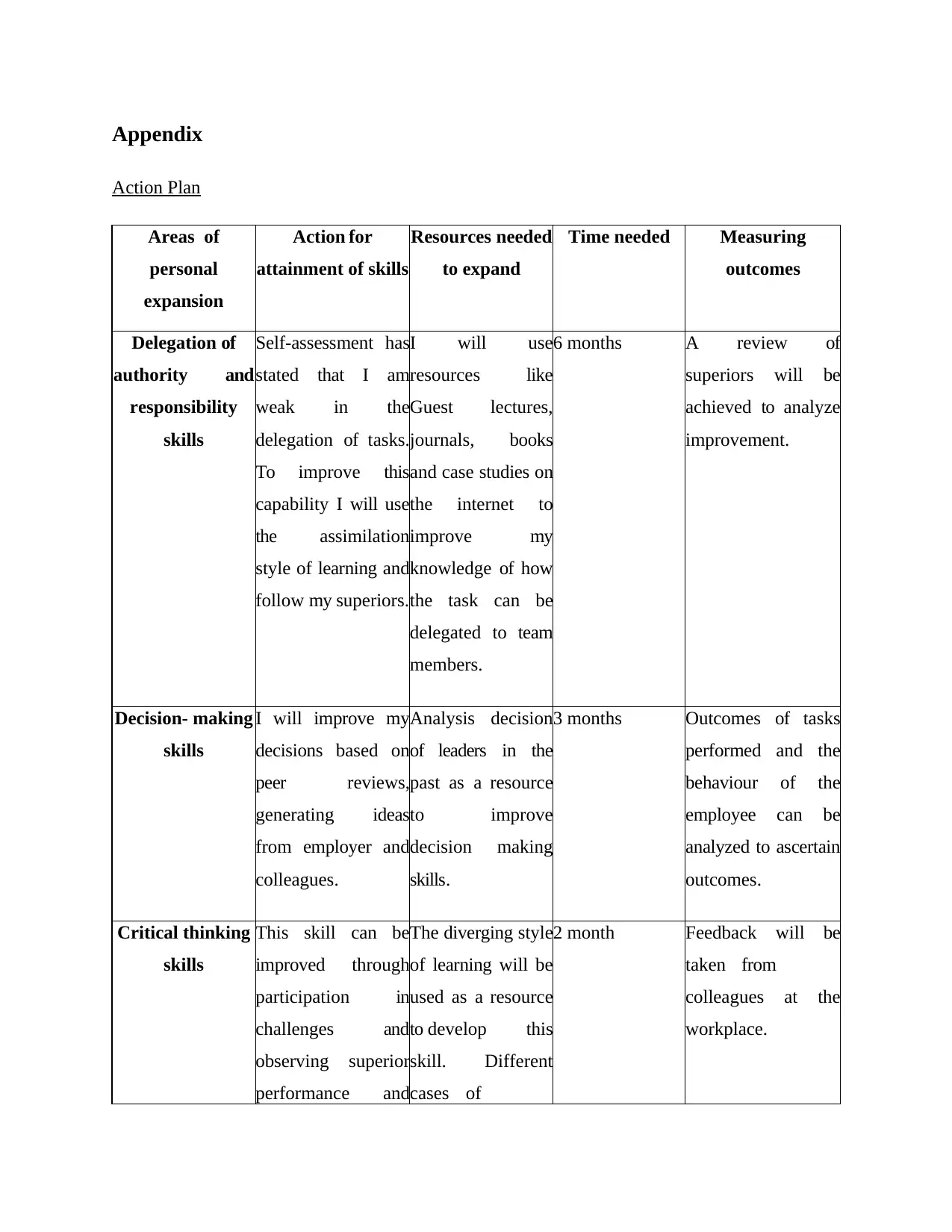
Appendix
Action Plan
Areas of
personal
expansion
Action for
attainment of skills
Resources needed
to expand
Time needed Measuring
outcomes
Delegation of
authority and
responsibility
skills
Self-assessment has
stated that I am
weak in the
delegation of tasks.
To improve this
capability I will use
the assimilation
style of learning and
follow my superiors.
I will use
resources like
Guest lectures,
journals, books
and case studies on
the internet to
improve my
knowledge of how
the task can be
delegated to team
members.
6 months A review of
superiors will be
achieved to analyze
improvement.
Decision- making
skills
I will improve my
decisions based on
peer reviews,
generating ideas
from employer and
colleagues.
Analysis decision
of leaders in the
past as a resource
to improve
decision making
skills.
3 months Outcomes of tasks
performed and the
behaviour of the
employee can be
analyzed to ascertain
outcomes.
Critical thinking
skills
This skill can be
improved through
participation in
challenges and
observing superior
performance and
The diverging style
of learning will be
used as a resource
to develop this
skill. Different
cases of
2 month Feedback will be
taken from
colleagues at the
workplace.
Action Plan
Areas of
personal
expansion
Action for
attainment of skills
Resources needed
to expand
Time needed Measuring
outcomes
Delegation of
authority and
responsibility
skills
Self-assessment has
stated that I am
weak in the
delegation of tasks.
To improve this
capability I will use
the assimilation
style of learning and
follow my superiors.
I will use
resources like
Guest lectures,
journals, books
and case studies on
the internet to
improve my
knowledge of how
the task can be
delegated to team
members.
6 months A review of
superiors will be
achieved to analyze
improvement.
Decision- making
skills
I will improve my
decisions based on
peer reviews,
generating ideas
from employer and
colleagues.
Analysis decision
of leaders in the
past as a resource
to improve
decision making
skills.
3 months Outcomes of tasks
performed and the
behaviour of the
employee can be
analyzed to ascertain
outcomes.
Critical thinking
skills
This skill can be
improved through
participation in
challenges and
observing superior
performance and
The diverging style
of learning will be
used as a resource
to develop this
skill. Different
cases of
2 month Feedback will be
taken from
colleagues at the
workplace.
⊘ This is a preview!⊘
Do you want full access?
Subscribe today to unlock all pages.

Trusted by 1+ million students worldwide
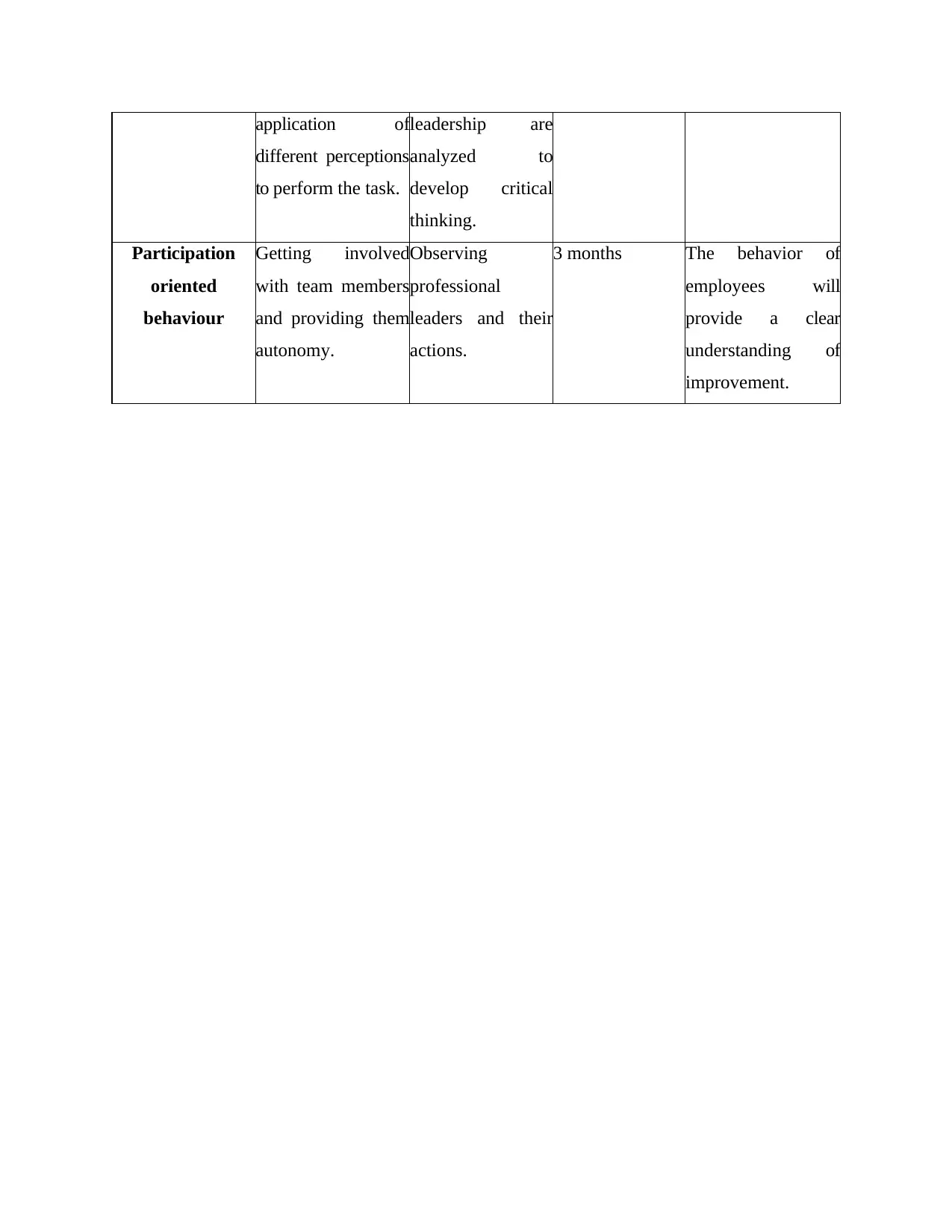
application of
different perceptions
to perform the task.
leadership are
analyzed to
develop critical
thinking.
Participation
oriented
behaviour
Getting involved
with team members
and providing them
autonomy.
Observing
professional
leaders and their
actions.
3 months The behavior of
employees will
provide a clear
understanding of
improvement.
different perceptions
to perform the task.
leadership are
analyzed to
develop critical
thinking.
Participation
oriented
behaviour
Getting involved
with team members
and providing them
autonomy.
Observing
professional
leaders and their
actions.
3 months The behavior of
employees will
provide a clear
understanding of
improvement.
1 out of 10
Related Documents
Your All-in-One AI-Powered Toolkit for Academic Success.
+13062052269
info@desklib.com
Available 24*7 on WhatsApp / Email
![[object Object]](/_next/static/media/star-bottom.7253800d.svg)
Unlock your academic potential
Copyright © 2020–2025 A2Z Services. All Rights Reserved. Developed and managed by ZUCOL.





